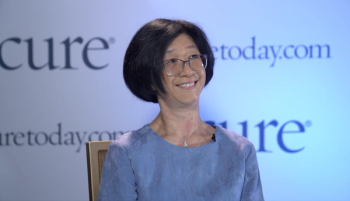
When it comes to learning about their disease, patients with cancer can have different preferences, from wanting to discuss treatments with their providers or read handouts, while others may not want to know much at all.

Brielle Benyon, Assistant Managing Editor for CURE®, has been with MJH Life Sciences since 2016. She has served as an editor on both CURE and its sister publication, Oncology Nursing News. Brielle is a graduate from The College of New Jersey. Outside of work, she enjoys spending time with family and friends, CrossFit and wishing she had the grace and confidence of her toddler-aged daughter.
Follow Brielle on Twitter @Brielle_Benyon.

When it comes to learning about their disease, patients with cancer can have different preferences, from wanting to discuss treatments with their providers or read handouts, while others may not want to know much at all.

Patients with cancer have so many resources available to them to learn about their disease as well as their treatment options, explained a research nurse from Dana-Farber Cancer Institute.

Treatment with androgen deprivation therapy in combination with Zytiga, docetaxel and prednisone improved radiographic progression-free survival and overall survival in patients with de novo metastatic castration-sensitive prostate cancer.

From “Leave It to Beaver” actor Tony Dow revealing his cancer diagnosis to a woman faking a cancer diagnosis to collect $100,000 in donations and a European soccer star finishing treatment, here’s what’s happening in the cancer space this week.

Mental wellbeing is more of a focus than ever before in cancer care, and while treatments continue to get better, there is still a long road ahead, according to Patrick Dempsey.
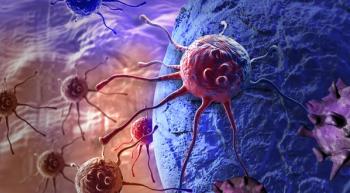
The first patient was dosed in a clinical trial evaluating the radiopharmaceutical agent, CycloSam, in patients with bone cancer or cancer that has metastasized to the bone.

Updated trial results showed that the use of Kisqali plus fulvestrant was associated with an approximate 33% decrease in risk of death for women with HR-positive, HER2-negative advanced breast cancer.

Results from a phase 3 trial showed that the combination of Nubeqa, docetaxel and androgen-deprivation therapy significantly decreased the risk of death for men with a certain type of prostate cancer.

The trial of CLR 131 (iopofosine) for relapsed/refractory Waldenstrom’s macroglobulinemia will continue, as the drug will be studied in an estimated 50 patients.

One of the most feared side effects from chemotherapy treatment is hair loss, but scalp cooling can help patients maintain their locks.
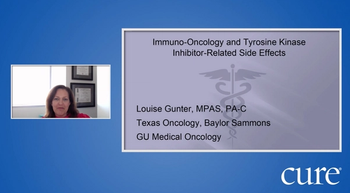
Watch Louise Gunter, from Texas Oncology, discuss IO/TKI-related side effects, during the CURE Educated Patient Kidney Cancer Summit.

From an osteosarcoma survivor modeling inclusivity in the fashion world to rock guitarist Paul “Bonehead” Arthurs being diagnosed with cancer, here’s what’s happening in the cancer space this week.
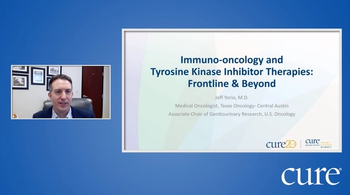
Watch Dr. Jeff Yorio, from Texas Oncology, discuss treatment with the combination of immunotherapy and tyrosine kinase inhibitors, during the CURE Educated Patient Kidney Cancer Summit.

After Enhertu showed promising clinical trial results, the Food and Drug Administration agreed to speed up the development and review of the drug for certain patients with unresectable or metastatic breast cancer.

Chemotherapy-induced peripheral neuropathy is a common side effect of patients undergoing cancer treatment, though many patients are not fully informed about the condition before their therapy starts.

The first patient was dosed in the CLAUDIO-01 trial, analyzing SOTO102 in patients with certain types of gastric and pancreatic cancers.

The FDA granted a Fast Track designation to ofra-vec plus paclitaxel for the treatment of patients with platinum-resistant ovarian cancer.

An expert discusses the side effects patients with kidney cancer may experience from immunotherapy and tyrosine kinase inhibitor treatment, and how more research is needed in to ensure patients experience less side effects.

From Philadelphia Flyers’ employees suing the organization after developing a rare blood cancer to experts proposing a new name for low-risk prostate cancer and an actor on Disney+’s “The Mandolorian” dying of cancer, here’s what is happening in the cancer space this week.

The pharmaceutical company developing a combination regimen of ublituximab plus Ukoniq (known as U2) pulled the drug duo’s indications for the treatment of multiple types of blood cancer after clinical trial results fell short of improving overall survival.

Findings from an early-phase clinical trial show that treatment with epcoritamab led to a 63.1% response rate in patients with pretreated large B-cell lymphoma.

By understanding what a TNM staging score is, patients and clinicians can determine the best line of treatment for their kidney cancer, as well as what the survivorship care plan should be.

The clinical development of BEMPEG plus Opdivo will end after clinical trials showed that the drug combination did not lead to significant improvements in outcomes in patients with kidney or bladder cancer.

Patients within the study who developed the rare skin condition were more likely to experience better tumor responses than those who did not develop the side effect.

The plan, according to the San Diego-based pharmaceutical company, is to launch a phase 3 trial to analyze the safety and efficacy of a novel drug in mantle cell lymphoma in the second half of 2022.

Earlier in the year, clinical trials assessing magrolimab for myelodysplastic syndrome and acute myeloid leukemia were put on a partial clinical hold, but now the FDA said that they can start enrolling patients again.

The Food and Drug Administration granted a fast-track designation to Bria-IMT for the treatment of patients with metastatic breast cancer.

In recent years, BCMA-targeted therapies have changed the landscape of relapsed/refractory myeloma treatment, filling a previously unmet need.

Anemia and anticoagulant use were both associated with higher blood loss and drainage volume, which may prolong a hospital stay after breast reconstruction surgery, according to recent study results.
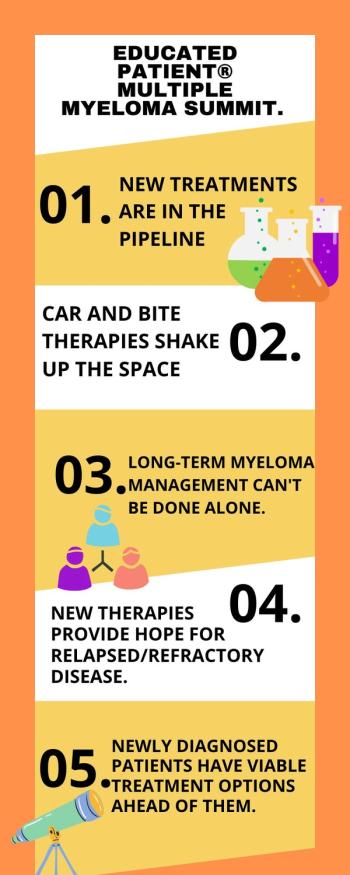
Here are some key takeaways from the CURE® Educated Patient® Multiple Myeloma Summit.